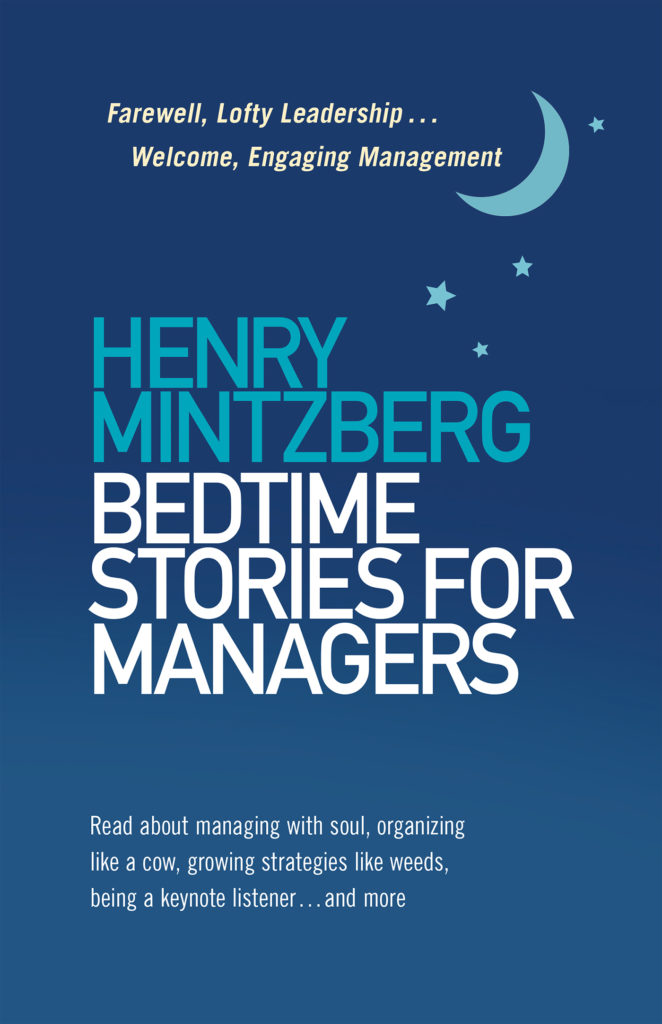Have you experienced poor management at some point in your career?
By Mo Waja (October 25, 2019)
Bedtime Stories for Managers, Henry Mintzberg, Berrett-Koehler Publishers, February 5, 2019, 200 pp. $21.78
Bedtime Stories for Managers is enjoyable collection of insights and anecdotes from Henry Mintzberg, a clear thought leader from the get-go. With a refreshingly conversational tone, Mintzberg tackles the idea of management with a metaphorical lens that brings to mind Aesop’s Fables… with a corporate twist.
Mintzberg uses short, pointed stories to drive home realties of the nature of management that too many experience, and far too few question, in a work that approaches the concept of ‘Management’ with an ironic humour that, at times, tastes a little more bitter than sweet.
Although there can be no doubt that Bedtime Stories for Managers successfully covers what management is functionally, emotionally, and even psychologically – both for the employee and the manager – where the work runs into challenges is in its applicability.
Without a doubt Bedtime Stories for Managers is a storybook in everything except the opening line of “Once upon a time…” yet in its metaphorical approach to organizing like a cow or the board as a bee, the work perhaps loses some of the practical application of the dos and don’ts of management that a clear approach from a tenured professional in the space (which Mintzberg certainly is) might achieve.
That said, this is not necessarily a bad thing – if approached from the right perspective.
To maximize value, Mintzberg’s work demands a reader who is prepared to absorb but also interpret, analyze, and apply to the context of their own career.
This is a piece intentionally designed to give no easy answers, but instead demands of the reader to mine insights using the pickaxe of their own lived experience. That means, intriguingly, that the readership experience of each individual consuming this work is likely to be different, depending on their organizational experience, tenure, and position as a higher tier manager, mid-level manager, or employee growing in their managerial experience.

We would be remiss not to note, however, that the scope of this work goes beyond the leader/manager or manager-in-training. This book can serve as bible and confessional (perhaps more formally known as ‘professional development’) to the employee struggling with their own manager and even a path to manage that manager.
The ideal reader for this work is the professional (at any level) who has experienced poor management at some point in their career and who is looking for a way to avoid and/or better it – both within their organization and within themselves. That is to say, the ideal reader for this work is everyone who has ever worked in any workplace.
Mo Waja is a nonprofit storytelling expert, a professional speaker, marketer, author, podcaster, an Account Manager at Blakely and Co-Host and Producer of Fifteen-Minute-Fundraising. @iammowaja
Expect more from our managers than an expectation that employees manage them
By Maryann Kerr (October 25, 2019)
The Unwritten Rules of Managing Up, Project Management Techniques from the Trenches, Dana Brownlee, PMP, Berrett-Koehler Publishers, February 26, 2019, 176 pp. $28.89
In The Unwritten Rules of Managing Up, Project Management Techniques from the Trenches, Dana Brownlee, PMP, makes it very clear that while this book is about difficult bosses it is not about dealing with what she calls “DEFCON 1” bosses. DEFCON is a military term and is short for defense readiness condition. A DEFCON 1 boss is defined by Brownlee as one who demonstrates any one or combination of the following:
- “Sexual harassment or inappropriate sexual behavior
- Overtly racist or misogynistic behavior
- Violent or abusive behavior
- Illegal acts
- Clearly volatile, seemingly emotionally or mentally unstable behaviors
- Blatantly lying or misrepresenting material facts consistently
- Seeming to lack any moral compass
- Overtly sabotaging others’ success
- Acting out of a personal vendetta
- Intentionally encouraging a toxic or dysfunctional environment
- Suffering from alcohol or substance abuse
- Completely inept, incompetent, or otherwise dangerously ineffective leadership.”
With that lot out of the way, the bosses Brownlee is hoping to help with are those who are well-intentioned but, perhaps, just average managers. Brownlee calls them “difficult” and points out that this is a relative term.
“Indeed, one typically tends to assess a particular boss’s level of ‘difficulty’ in part based on their experiences with other bosses or one’s personal preferences or expectations.”
So, if you are looking for answers for dealing with bosses in the uber difficult or downright DEFCON 1 category, this is not the book for you. In fact, Brownlee suggests that these kinds of bosses likely require you to engage “human resources, employee assistance programs, legal support or even law enforcement as needed.”
However, this book does address a wide range of tough boss situations and will be particularly useful for those who are 5-10 years into their careers. Throughout the book, Brownlee reminds her reader that above all else, we must build relationships with our bosses and that great relationships are at the core of everything. Her techniques won’t work if there is not a decent working relationship between you and your difficult boss.
So, what does Bronwlee mean by “managing up?” According to the author,
“Managing up is about helping flawed, mediocre, and good managers be more effective. Managing up isn’t a magic potion that will fix irreparably broken or terribly flawed individuals…Managing up (is) a subordinate customizing their work style/behaviors to better suit their manager and taking steps to make their manager’s job easier in an attempt to optimize success for all.”
Brownlee identifies six difficult boss types, the Tornado, Wishful Thinker, Clueless Chameleon, Missing in Action, Meddlesome Micromanager and the Naked Emperor. Dealing with each in separate chapters, she provides fun and often familiar stories that clarify each type of boss and their difficult approach. Brownlee provides excellent pointers for how to manage each situation, but the best part of each chapter is when she points out what to do if you, the reader, are the difficult manager. These pointers are excellent and provide a road map to becoming a better leader and manager.
The second last chapter on managing up even with a great boss has some general and excellent tips for any workplace. Brownlee focuses on some basic best practices and provides tangible suggestions on how to:
- Build relationships before you need them
- Be Likable and Low Maintenance
- Be a Star Where you Are
- Customize Your Behaviors to Fit Your Boss’s Preferred Work and Communication Style and
- Always Think Three Steps Ahead. Think Strategically.
Finally, Brownlee provides managers with tips on how to create an environment where employees know that you appreciate their managing up skills. This includes ensuring employees are aware of your preferences and understand the shared team ground rules.

She concludes with the suggestion that “it’s so much easier to pile onto the “big, bad boss” theory than it is to take a hard look in the mirror, but it bears repeating that the boss-subordinate relationship is a very symbiotic one in which both parties bear responsibility. If you find yourself repeatedly complaining about boss after boss, the hard truth is that the difficult one in the relationship might be you.”
This reviewer doesn’t necessarily agree – it could just as easily be that you’ve had one lousy boss after another! My conclusion? There are some excellent tips in the book, and we should expect more from our managers than an expectation that employees manage them.
Maryann Kerr has served local, provincial and national organizations in executive leadership. She is currently the Chief Happiness Officer/CEO and principal consultant with the Medalist Group, a philanthropic firm she founded in 2016.

